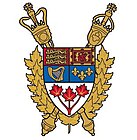Parliamentary Protective Service
|
Parliamentary Protective Service Service de protection parlementaire |
|
|---|---|
| Abbreviation | PPS/SPP |

Badge of the Parliamentary Protective Service
|
|
| Agency overview | |
| Formed | June 23, 2015 |
| Employees | ~400 (2016) |
| Annual budget | CA$62,000,000 |
| Legal personality | Governmental: Government agency |
| Jurisdictional structure | |
| Constituting instruments |
|
| General nature | |
| Operational structure | |
| Headquarters | M. J. Nadon Government of Canada Building 73 Leikin Drive Ottawa, Ontario |
| Elected officers responsible | |
| Agency executives |
|
| Parent agency | Royal Canadian Mounted Police |
| Divisions | National Division: National Capital Region |
| Facilities | |
| Detachments | 3 |
| Website | |
| www |
|
The Parliamentary Protective Service (PPS) is a Canadian federal law enforcement agency that is mandated to protect life and property and maintain the peace and public order within the Parliamentary Precinct in Ottawa, Ontario.
Operationally, PPS is composed of over 300 constables operating under the Royal Canadian Mounted Police (RCMP) National Division as well as 100 security scanners. The Director of PPS, a superintendent of the RCMP, operates under policies set by the speakers of the House of Commons and the Senate.
PPS also has a plain-clothes unit mandated to provide VIP protection services to members of parliament, ministers, dignitaries and the prime minister of Canada.
PPS constables are provided a variety of equipment such as SIG Sauer P226 9 mm (0.35 in) service pistols as well as bulletproof vests, batons, OC spray, Colt Canada C8 carbines, gas masks, ASP baton, RCMP defensive Tactics and x26 tasers.
In 2009, members of Greenpeace were able to climb onto the roof of the Parliament Buildings as part of a protest. Then, on October 22, 2014, Michael Zehaf-Bibeau evaded security and entered the Hall of Honour with a rifle and a knife, injuring a constable.
In November 2014 the Joint Advisory Working Group on Security identified lack of communication among security groups at Parliament Hill as a significant problem, and recommended combining the existing House of Commons security, the Senate Protective Service, and RCMP detachment in charge of the grounds into one integrated security service. Parliament subsequently passed Bill C-59, which mandated this change.
...
Wikipedia
